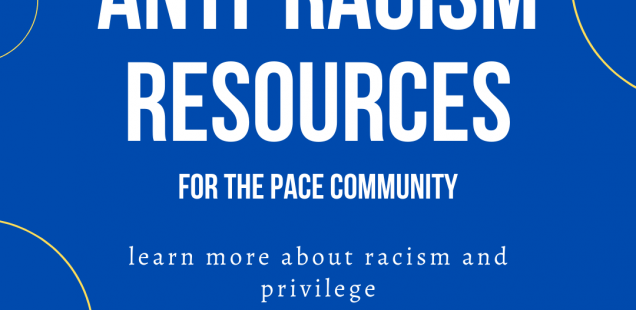
COVID-19 and BLM: Ten Actions You Can Take Right Now
By Heather Novak, Interim Director of CCAR
Between COVID-19 and its disproportionate impacts on low income communities and communities of color and recent instances of police brutality against the black community that highlight a long and violent history of systematic racism that shapes all institutions in the US, many members of the Pace community are looking to get involved in pushing for change. If you want to help, but you don’t know how to start or where to go, you aren’t alone. Even with all of the information people have access to there is no one way to contribute to change. No matter what your skill set, you can start today!
- Make a commitment to educate yourself everyday, and stick with it even after the headlines fade. Everyone wants to do something now to make a difference. This is not in itself a bad thing, but when we don’t do the work to educate ourselves about the issues, and look at the people and organizations who have been working on them all along, we cannot be as effective as we could be and have the potential to cause as much harm as we can good. This does not mean that you cannot participate in pushing for change if you aren’t an expert. It means that you understand that you are not an expert and learn from and support those who are. For white people, we need to listen to what the black community is saying, and has been saying for decades. For those becoming interested in transforming policing in the US, we need to listen to the organizers who have been fighting the prison industrial complex for decades. It is your responsibility to educate yourself and there is no better time like the present to do so. I would suggest that you start first with the readings and media tab at www.pace.edu/takeaction.
- Recognize because something has not impacted you directly does not mean it doesn’t exist or is not a problem for our communities and country. This action is part of actively educating yourself. Your experiences influence your perspective and it is a positive and important step to actively understand your experience isn’t everyone’s. Seek out others perspectives, but also realize that right now may not be the best time to ask people to educate you as to their personal experiences. You can find plenty of that online.
- Get to know who your elected officials are. I understand that a lot of people think politics are just for elected officials. Many of the issues we are facing today are impacted by decisions made at the state and local level. Do you know who your mayor or county executive is and what they do? Did you know you have representatives at the state and federal level? Some tools that can help you do this are www.commoncause.org/find-your-representative, www.usa.gov/elected-officials, or myreps.datamade.us/
- Register to vote or if you are not eligible, register those who can. There are different deadlines for different elections in different states. You cannot hold people accountable if you are not part of the process to do so. You can start out with your state’s board of elections, and/or visit bit.ly/registerpace
- Research, support and advocate for organizations who have been doing the work. The racist violence facing our communities of color did not begin yesterday, and neither did the advocacy of black organizers as embodied in today’s Black Lives Matter movement. The knowledge and resources these leaders bring is important to know about and learn from. You can refer back to the www.pace.edu/takeaction organizations tab.
- Use the strengths and skills you have. Maybe you have social anxiety and protesting isn’t for you. That is ok! Are you a social media wiz? Offer that to an organization that needs it. If you are a sewer, make masks for those on the front lines. If you are a writer, write an opinion piece for your local paper, or a letter to an elected official. If you are a researcher, make your talents available to local organizations. Raise money or supplies for organizations doing the work. There isn’t just one way to make change. There are a lot of little things that are needed to get us where we want to go. Note: Make sure you have a partner that needs these things before you start gathering things up.
- Show up! Attend events, join organizations, sign petitions. Get in with a group doing this work and support them with your presence. This isn’t just about showing up to the things you organize or plan, but being there for others as well. A bonus during this time is that you can show your support virtually or in person.
- Speak up at home! Did one of your family members or friends say something offensive? Ask them what they mean and wait for their answer. Hold people accountable and educate people when you can. You might not be able to change their mind, but they will know you don’t support marginalizing others. Meet people where they are and push them towards personal accountability.
- Speak up at school! Wish your school or workplace was doing more to support the Black Lives Matter movement? Investigate diversity policies, research institutional financial commitments, push for curriculum changes, support groups doing diversity work, share opportunities for anti-racism training, etc. As a Pace student, you can start by vocalizing your support for the demands put forth by BSU (NYC and PLV) and SGA (NYC) through social media and emails to administrators. Make sure also to check out the Division of Diversity, Equity and Inclusion at Pace for information and ways to engage.
- Take care of yourself and others. Audre Lorde said “Caring for myself is not self-indulgence, it is self-preservation, and that is an act of political warfare.” Change is a marathon not a sprint. If we do not take care of ourselves and others, we cannot be effective in the long run. Take a break, decompress, recharge and help others do that too. Check in on your friends. You can start here!





